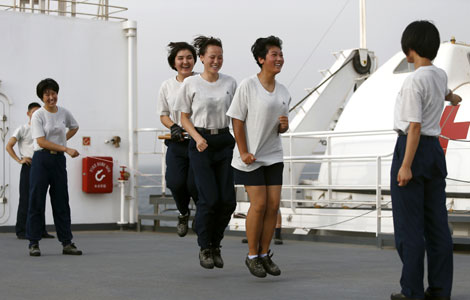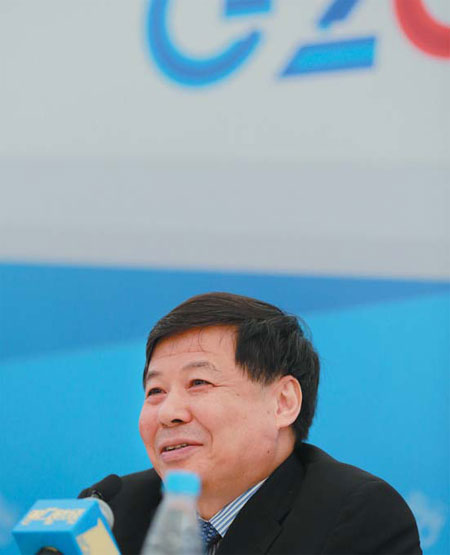Finance official: US poses a dual threat to global stability
Updated: 2013-09-06 07:01
By Fu Jing and Xie Songxin in St. Petersburg, Russia (China Daily)
|
|||||||||||
Vice-minister singles out plans for Syria and monetary policy
A senior Chinese official has warned that the United States is posing a dual threat to global economic stability with its plans to relax its monetary policy measures and its threats to attack Syria for its alleged use of chemical weapons.
Zhu Guangyao, vice-minister of finance, made the warnings prior to the opening of the two-day G20 summit in St. Petersburg, Russia, which ends on Friday. Zhu urged the US to cautiously reshuffle its macroeconomic policy and to contribute more to global economic growth.
"I am quite concerned about the economic consequences of such military action (against Syria)," Zhu said.
Zhu said a military attack against Syria could "negatively impact" the global economy, which he said needs coordination among global powers to stabilize growth and create jobs.
Zhu said the attack may boost the price of oil and suppress global economic growth. He said every time oil prices increase by $10, growth in the global economy will drop by 0.25 percent, citing International Monetary Fund research.
Zhu said problems in Syria should be solved through the United Nations and with diplomatic efforts.
Sergei Sutyrin, head of the department of world economy at St. Petersburg State University, expressed a similar sentiment.
Sutyrin said it would be a "great mistake" if G20 leaders did not try to convince US President Barack Obama of abandoning the idea of a military attack against Syria.
He said China and Russia should lead the way in gathering G20 countries opposed to the attack in dissuading Obama.
"There would be no reason or no positive outcome of that attack, even in a rather limited scale," Sutyrin said.
"The result of any attack would be traumatic and tragic and this would move our world into a very, very shaky situation."
Alarm to US
Zhu urged the US on Thursday to cautiously scale down its quantitative easing policy to prevent a massive spillover effect on emerging economies.
The US Federal Reserve launched the current quantitative easing policy, which is composed of expansionary monetary measures, in 2010 to further stimulate the economy. The Fed's first round of QE measures came immediately after the 2008-09 financial crisis. The US' QE measures is one of the main topics at the ongoing G20 summit.
"The US should take account of the spillover effects to emerging economies. Some countries have already suffered from economic slowdowns and capital outflows because of the possible policy change (in the US)," Zhu said.
Zhu said the major challenges to the global economy are the US' plans to relax its QE measures, fragility in Europe and economic uncertainties in emerging countries.
Based on the IMF economic outlook, China will contribute almost 28 percent to global economic growth this year, while the US will contribute 12.35 percent, Zhu said.
"We hope the US will make bigger contributions to the global recovery and the creation of jobs," said Zhu.
Contact the writers at fujing@chinadaily.com.cn and xiesongxin@chinadaily.com.cn
|
Chinese Vice-Minister of Finance Zhu Guangyao answers questions at a news conference during the G20 Summit in St. Petersburg, Russia, on Thursday. Xie Songxin / China Daily |
(China Daily 09/06/2013 page3)
Today's Top News
Finance official: US poses a dual threat to global stability
Emerging markets must be heard
Beijing clean air action plan well-received
Japan to test 'ice wall' for leaking water
Xi calls for closer G20 ties to boost world economy
18-year-old panda conceives triplets
Films aim for success abroad
Students find low-budget education abroad
Hot Topics
Lunar probe , China growth forecasts, Emission rules get tougher, China seen through 'colored lens', International board,
Editor's Picks

|

|

|

|

|

|






